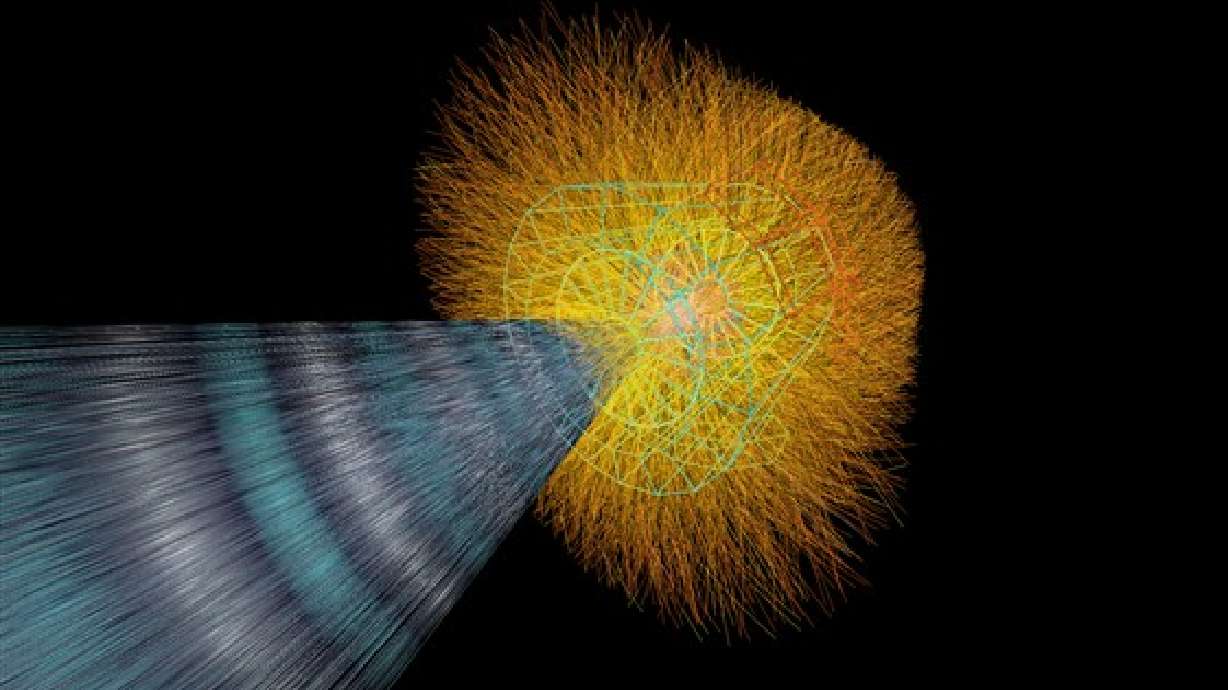Estimated read time: 4-5 minutes
This archived news story is available only for your personal, non-commercial use. Information in the story may be outdated or superseded by additional information. Reading or replaying the story in its archived form does not constitute a republication of the story.
Last week, the physics community was thrown into a tizzy over the discovery of neutrinos that appeared to be traveling faster than the speed of light, something shown again and again to be impossible based on Einstein's theories. Some said that Einstein had been overturned, and some say that it is simply impossible. Who is right, and what does it really mean if they are traveling faster than light?
The experiment
Scientists at CERN were not only concerned with the speed of neutrinos. They were also trying to test other properties of these very strange particles, which can blow through a planet like a knife through butter, and which stream out of the sun with phenomenal numbers – right now, every centimeter of your body has billions of them flying through it. But they are also notoriously tough to detect, weigh almost nothing and can change between three different varieties almost willy-nilly.
In order to look at these properties, CERN sent a beam of neutrinos through the earth's crust to a a facility at Gran Sasso, Itally. While CERN and Gran Sasso were looking at these other neutrino properties, it also proved to be a simple enough experiment to test the speed of the neutrino as well. What they found was astonishing - The neutrinos were arriving at their destination a full 60 nanoseconds earlier than they should have. Or approximately 0.0025 percent faster than light.
That sounds infinitesimal. That's only 60 billionths of a second. But when you consider that many expiriments have confirmed Einstein's theories to accuracies thousands of times smaller, you can see how huge a deal it is for some neutrinos to arrive so early to the party.

Early? So what? What does that mean?It's not just that they were early - it's what that implies. As is readily apparent from every article on the matter, this implies that the neutrinos can travel backward in time - that time travel is possible.
This is because Einstein's theories require that everything be observed from a specific frame of reference, but an observation from a specific frame of reference does not have to agree with observations from any other frame of reference in exactly the same way.
So if something is moving faster than light in a specific direction, the only way the math works out is if that thing is also moving backwards in time. So these neutrinos arriving early means that they were also moving backwards in time.
But this also creates problems in another sense. The speed of light is called the universe's speed limit for a reason: it mathematically amounts to the the maximum rotation an object can turn in spacetime. Think of it like this - in two dimentions, you can rotate 360 degrees and you are right back were you started in terms of your orientation.
The same thing applies to the speed of light. In a mathematical sense, your orientation in spacetime is the same when you are going the speed of light as when you are at rest.
If these neutrinos are traveling faster than the speed of light, it would be like saying that they are getting back to where they started in 361 degrees instead of 360, so to speak. Which seems impossible.
There are also problems with causality. Causality basically says that an effect has to come after the cause. Catching a baseball has to happen after it is thrown. But if things can travel through time, then you could catch a baseball before it is thrown. Which seems flatly illogical.

Was the expiriment wrong?Quite possibly. There are a number of variables that could throw things off. An earthquake could change the distance between the two facilities in Italy and Swizerland. The moon could be distorting the earth's crust. The timing of the GPS system used in the measurements could be off. There are any number of things.
But it could also be right on. CERN scientists have been checking and rechecking every measurement for 6 months. And they are pretty good at what they do.
The next step is for scientists at other facilities to perform the expiriment again. Which is exactly what is happening. Fermilab in the U.S. is retooling some of their equipment to check CERN's work, and should be gathering data by next year. Until this experiment gets replicated there, we won't really know whether we have to change everything, or whether CERN needs to step up their game.
Email: [dnewlin@ksl.com](<mailto: dnewlin@ksl.com>)









